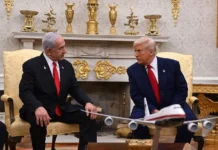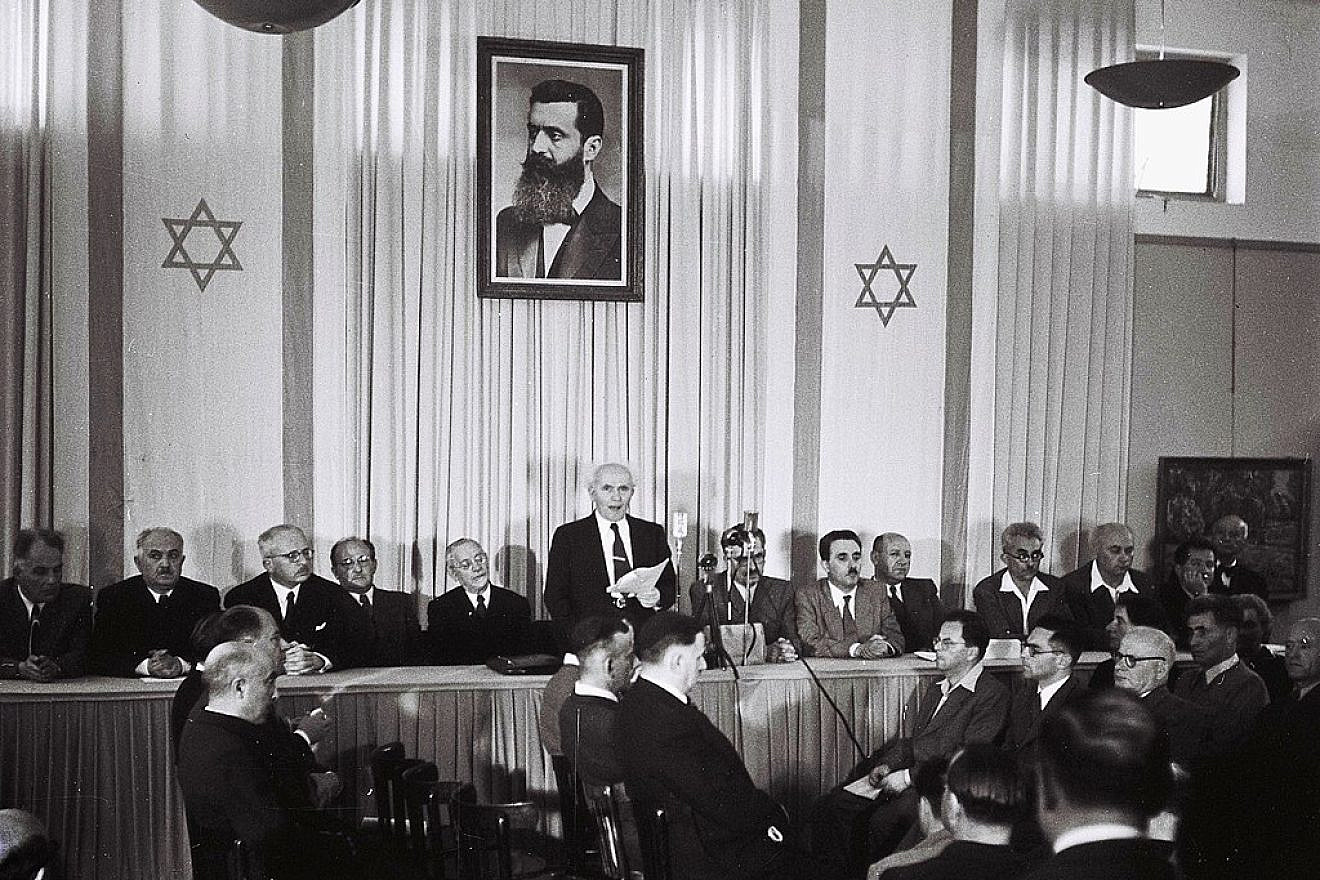“As embodied in the Declaration of Independence, the essence of the State of Israel is to be a Jewish and democratic state.” — Col. (res.) Adv. Pnina Sharvit Baruch of the Institute for National Security Studies, Feb. 19, 2023.
“The Declaration of Independence expresses a deep commitment to freedom, justice and peace in the spirit of the vision of the Biblical prophets.” — Yohanan Plesner, president of the Israel Democracy Institute, April 26, 2023.
One of the frequently employed accessories that opponents of the current coalition brandish in their choreographed frenzy against anything and everything that Benjamin Netanyahu’s government proposes is Israel’s Declaration of Independence.
The holy grail?
For decades, the Declaration has been a rarely referenced document in the Israeli political debate. Recently, however, it has been rediscovered and assumed a revered status as the holy grail of Israeli politics, allegedly embodying all the cherished values and virtues of Zionism.
According to the Netanyahu government’s adversaries, there is an irreconcilable contradiction between the contents of the Declaration and the substance of the government’s policy initiatives—particularly the much-maligned judicial reforms.
Indeed, the Declaration featured as a prominent prop during ongoing anti-reform demonstrations. A huge replica was hung from the Tel Aviv municipality building. Elsewhere in the city, another large-scale copy was spread out like a giant carpet on a Tel Aviv street.
But listening to the impassioned tirades of the anti-government agitators, one is left to wonder whether they have actually read the Declaration or are hoping that their audience has not.
Cherry-picking the Declaration
A vocal opponent of judicial reform, Times of Israel editor David Horovitz, wrote accurately but misleadingly, “Our Declaration of Independence promises that the State of Israel ‘will ensure complete equality of social and political rights to all its inhabitants irrespective of religion, race or sex; it will guarantee freedom of religion, conscience, language, education and culture.’”
In a similar vein, Pnina Sharvit, head of the law and national security program at the amply funded think-tank the Institute for National Security Studies, scolded, “Israel should be extremely cautious about breaching the delicate balance between the Jewish-nationalist component and the democratic-liberal component of its essence, as enshrined in the Declaration of Independence.”
Likewise, the president of the distinctly left-leaning Israel Democracy Institute, cherry-picked words from the Declaration, asserting,“The Declaration of Independence expresses a deep commitment to freedom, justice and peace in the spirit of the vision of the biblical prophets.”
Politicians pounce
Several Bibi-phobic opposition politicians also pounced on the Declaration in an effort to exploit it for their anti-government purposes. Thus, Yair Lapid, with his usual superficial mindlessness, proposed that a way out of the judicial reform impasse would be to compose a constitution, something that has eluded Israeli leaders for almost eight decades. This prospective constitution, he said, should commence with the Declaration of Independence, which according to him, “expressed the moral heart of the nation.”
Benny Gantz has repeatedly invoked the Declaration in his regular anti-reform harangues. In one public appearance, he said that we need to find “a new balance, to recalibrate the way we live with one another … to make us stable and share the same vision,” stipulating that Israel’s Declaration of Independence embodies that vision.
As I mentioned previously, it is difficult to know whether these anti-government Declaration enthusiasts have bothered to read the document they so fervently embrace, or whether they are merely banking on the hope that their audience has not.
After all, the focus of Israel’s Declaration of Independence is overwhelmingly on Jewish sovereignty and political independence in the ancestral Jewish homeland—not on liberal democratic governance.
Prescribing Jewish sovereignty, not liberal democracy
Indeed, the briefest content analysis of the Declaration will reveal that the words “Jew” or “Jewish” are mentioned over 20 times—virtually always in reference to the exercise of Jewish sovereignty, national independence and self-determination.
Likewise, the terms “nation” or “nationalism” appear over 10 times (not including references to the “United Nations” or “League of Nations”).
On the other hand, the Declaration uses the words “equal” or “equality” only twice, exclusively in the context of civil rights, not national rights. The words “democracy” or “democratic” and “liberal” or “liberalism” do not appear at all.
The Declaration is replete with references to the historical birthplace of the Jewish people, their connection to the land, their tradition and heritage, and the Bible. All of these are likely anathema to many of the current left-leaning Bibi-phobic demonstrators, who have adopted the Declaration as the centerpiece of their professed socio-political creed.
Indeed, the leaders of the opposition would do well to study the fables of Aesop, who warned, “Be careful what you wish for, lest it come true!”
























